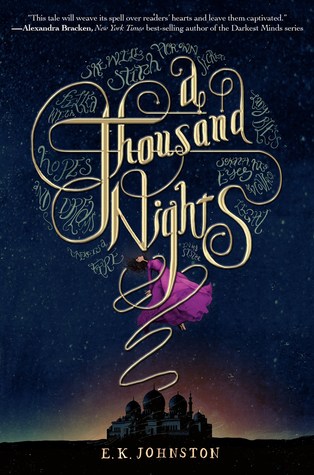"Lo-Melkhiin killed three hundred girls before he came to her village, looking for a wife. When she sees the dust cloud on the horizon, she knows he has arrived. She knows he will want the loveliest girl: her sister. She vows she will not let her be next.A Thousand Nights is a retelling of the Arabic tale, "A Thousand and One Nights." It's a tale of Scheherazade and a sultan. I have mentioned this tale in my review of The Wrath and the Dawn, but I'll tell it again. Scheherazade was clever, and she, to avoid death, told a story to the sultan every night and ended it on a cliffhanger. The next night, she will finish the story and tell a new one. And she will end it on a cliffhanger. The same thing will happen again and again, and the sultan will not execute her out of fear that he will never know the story's ending. Scheherazade does it for one thousand and one nights. (Title drop!)
And so she is taken in her sister’s place, and she believes death will soon follow. Lo-Melkhiin’s court is a dangerous palace filled with pretty things: intricate statues with wretched eyes, exquisite threads to weave the most beautiful garments. She sees everything as if for the last time. But the first sun rises and sets, and she is not dead. Night after night, Lo-Melkhiin comes to her and listens to the stories she tells, and day after day she is awoken by the sunrise. Exploring the palace, she begins to unlock years of fear that have tormented and silenced a kingdom. Lo-Melkhiin was not always a cruel ruler. Something went wrong.
Far away, in their village, her sister is mourning. Through her pain, she calls upon the desert winds, conjuring a subtle unseen magic, and something besides death stirs the air.
Back at the palace, the words she speaks to Lo-Melkhiin every night are given a strange life of their own. Little things, at first: a dress from home, a vision of her sister. With each tale she spins, her power grows. Soon she dreams of bigger, more terrible magic: power enough to save a king, if she can put an end to the rule of a monster."
The writing style is something I really have to point it. It stands out so well that it shines brighter than everything else... Brighter than plot, story, and characters. It's beautiful, and I can pull a lot of quotes from the story. (But that's not important in this review.) The words really flow, and the author uses tons of flowery language.
The world building is set in the desert and Lo-Melkhiin's home. The book doesn't dive too deeply into the setting, and it isn't really necessary, because it is the story that matters. The story is dreamy, and it is dark. It's not quite like The Wrath and the Dawn even though both books are inspired by the Arabic tale. In fact, after reading the story, I realize that these two stories are pretty different. While The Wrath and the Dawn is perfect for those who love forbidden love, A Thousand Nights is for those who love to look beyond the page and read between the lines.
And there is the main character. She is unnamed, but her character speaks louder than her name ever could. For now, we'll just call her "Scheherazade." (And no, that is not her name.) Her words spin stories, and there is power in her sentences. She alone has the force to defeat Lo-Melkhiin, and after surviving night after night, she starts digging into her husband's past and attempting to discover the terrifying truth. You can't help but root for her.
The ending is perhaps the strangest part of the entire book. It doesn't seem to fit with the rest of the book, but it does fit. The ending works yet also doesn't. If you read and start analyzing the book, the ending works. But if you only see what's on the surface, it doesn't.
In conclusion, A Thousand Nights is great for those who love reading between the lines and those who enjoy writing metas/analysis about multi-layered stories. Fans of fairy tales would love this thought-provoking retelling.
Rating: Four out of Five

No comments:
Post a Comment